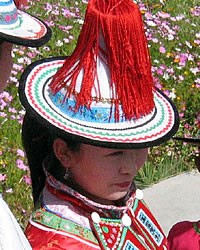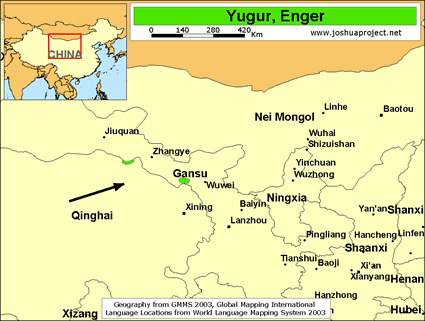The Chinese government has combined the Enger Yugur, who speak a Mongolian language, with the Turkic-speaking Saragh Yugur to form the official Yugur minority in China.
Most scholars believe the Yugur are descended from a nomadic tribe known as the Huiqu. The government first recorded the Huiqu during the Tang Dynasty (AD 618-907). In the mid-800s, heavy snowfall, combined with an attack from the forest-dwelling Kirgiz people forced the Yugurs to flee their Mongolian homeland. They moved to Gansu where they came under the control of the Tibetans. The world knew little of the Yugur and cutoff the region from the rest of the world for centuries until the completion of the Lanzhou- Urumqi railway line in 1963 which passes through the Yugur area.
The Yugur practice bird burials, similar to the Tibetans. They cut up dead corpses into pieces and take them to a mountaintop where ravens and other birds of prey come and devour the flesh. Historically, the Yugur divided themselves into nine separate clans. Each clan controlled its own herding area.
Tibetans converted them to Buddhism. Today, most Yugur remain followers of Tibetan Buddhism. In recent years, they have revived the ancient shamanistic religion and the cult of the "Emperor of Heaven," Han Tengri.
Although few Enger Yugur today have ever heard the name of Jesus Christ, in the past, many Christians lived in their region. The Ongkuts developed a widespread Christian culture, witnessed to by the many Christian crosses found by archaeologists. The Yugur descend, it is thought, from this tribe. When Marco Polo visited Dunhuang, near the Yugur's homeland, he reported, "It is true there are some Turks who hold to the religion of the Nestorian Christians." In 1992, the first Enger Yugur people believed in Christ.
The Enger Yugur need better access to Scriptures to learn about the love of God and how to follow him in their daily lives. The Enger Yugur need loving, willing workers to tell them the good news and disciple them in the ways of Christ.
Pray for workers to show the love of Jesus and to help them meet their material needs.
Pray for open hearts and minds to be receptive to the word.
Pray for the Enger Yugur people to have adequate materials to be discipled and to disciple others.
Scripture Prayers for the Yugur, Enger in China.
Operation China, Asia Harvest, Copyrighted © Used with permission.
| Profile Source: Joshua Project |











